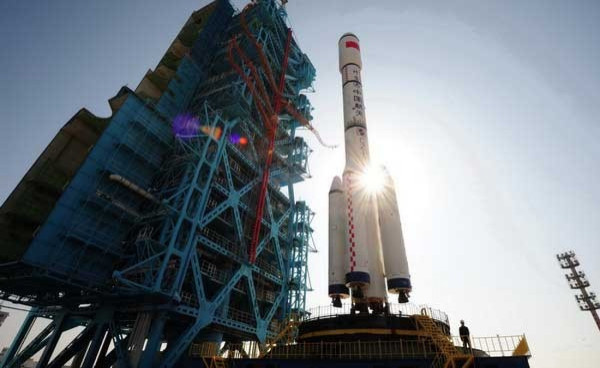China's Independent Space Age Begins Thursday, Launching Space Lab Tiangong-1

China will officially enter the Space Age on Thursday when the country launches Tiangong-1, its first independent space lab module.
Wu Ping, a spokeswoman for China's manned space flight project on Wednesday confirmed that Tiangong-1, which means Heavenly Palace, will be launched between 9:16 p.m. and 9:31 p.m. on Thursday local time. It will lift off aboard a Chinese Long March 2F rocket from the Jiuquan Satellite Launch Center in Northwest China.
Fuel has been injected into the Long March-2F carrier rocket in preparation for the planned launch, Ping told Chinese media. She added that China is confident about the launch, even though it is a risky scientific step.
The successful launch of Tiangong-1 means that China is on its way to usher in a new era of Chinese space exploration. The country has plans to build a 60-ton manned space station by the year 2020.
Tiangong, a three-story cigar-shaped module, is built to conduct a two-year unmanned docking experiment and conduct robotics. Throughout its time in orbit, the spacecraft will dock with three other spacecrafts: China's Shenzhou 8, Shenzhou 9 and Shenzhou 10. The other spacecrafts will be lift off at a later time.
China Radio International (CRI) reported that officials for the program said that docking could be a challenge for China's space program.
The rendezvous and docking is widely accepted as a technical difficulty, a spokesman told CRI. Not all of the docking missions are perfectly carried out, including recent ones on the International Space Station. China's first docking experiment also faces challenges. With that in mind, we have modified the carrier rocket, run simulation training on earth and made more than 200 emergency plans.
Engineers started conducting the final preparations for the launch on Monday. They had done a full ground simulation to ensure the module and its carrier rocket Long March 2F are prepared for the journey.
The unmanned spacecraft was originally set to launch into low Earth orbit between Tuesday and Friday, but it encountered a set back from poor weather. Moreover, an earlier launch was also hampered when a satellite launching failure occurred back in August when a Long March 2C rocket malfunctioned and was unsuccessful in sending the Shijian XI-04 satellite into orbit.
Officials said they delayed the launch because of safety concerns.
This is a significant test, Lu Jinrong, the launch center's chief engineer, told Xinhua. We've never done such a thing before.
© Copyright IBTimes 2024. All rights reserved.






















